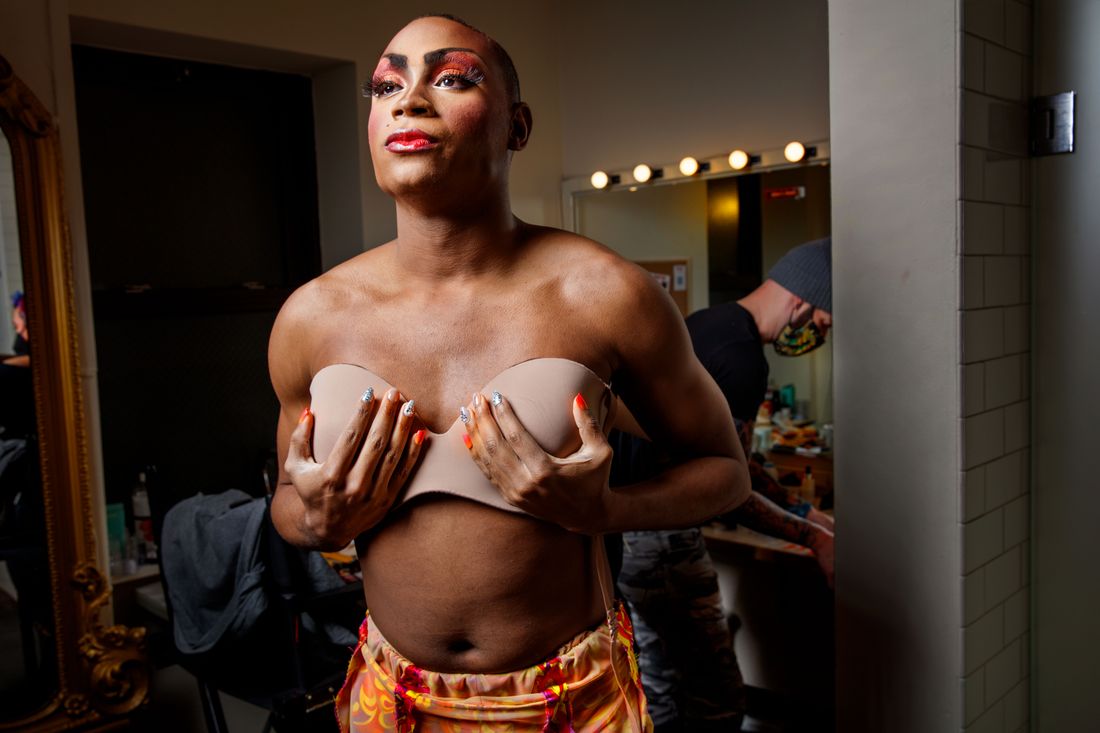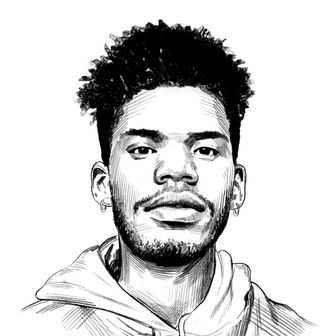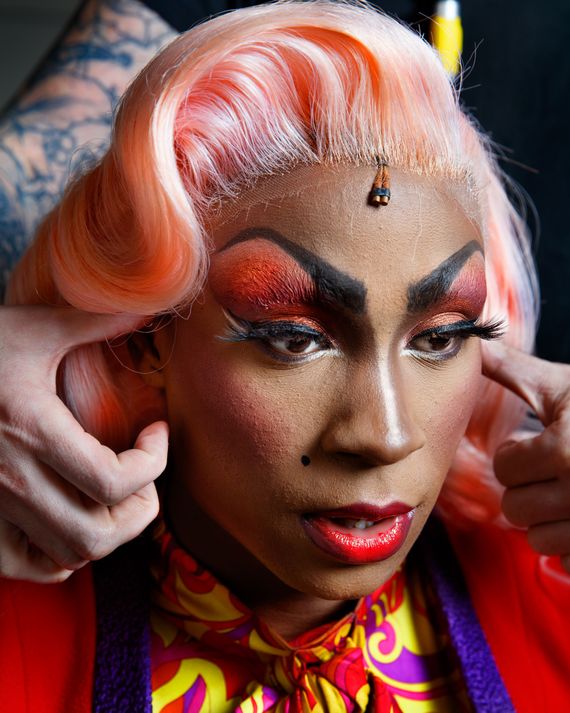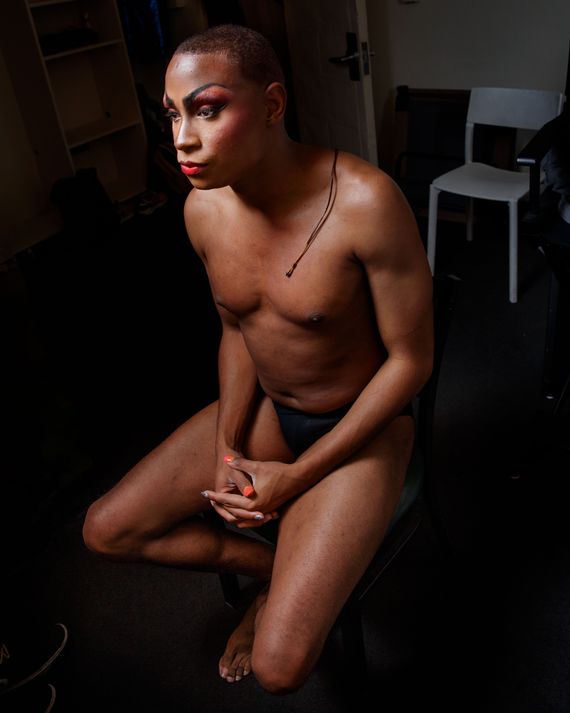
This article was featured in One Great Story, New York’s reading recommendation newsletter. Sign up here to get it nightly.
Jordan E. Cooper is a hustler. Straight-up, ten-toes-down, got-it-out-the-mud type shit. Before his name was plastered on a Broadway marquee, he was hawking tickets in the Theater District for his college shows at the New School. In 2016, Cooper had just launched a musical called Alice Wonder, a remix of ol’ girl in Wonderland that featured a traversal through the mind of a depressed 40-year-old Black woman. “I would stand outside of the Richard Rodgers Theatre or on subways and just hand out flyers,” he easily recalled. Yup, Cooper was that guy.
Now, at 27, he’s the youngest Black playwright to premiere work on Broadway. On a brisk evening in November, three lines stretched outside the Belasco Theatre for the first preview of his most ambitious show yet, Ain’t No Mo’, made up of gay, geeked millennials and B’way heads who’d heard through the grapevine that one of their own just made it to the big time.
The play is a prickly post-Obama satire directed by Stevie Walker-Webb and premised on an alternative history wherein the U.S. government funds a massive plan to return Black people to Senegal after Trump’s election. It consists of vignettes across a multiplicity of experiences from skinfolks who are just finding out that Africa can be a new home if we will it. Cooper stars as Peaches, a beat, bedazzled flight attendant escorting the last Airbus out. Its small cast — featuring intense performances from Crystal Lucas-Perry, Ebony Marshall-Oliver, Shannon Matesky, Marchánt Davis, and Fedna Jacquet in rotation as both enthused and reticent passengers — remains intact from its Obie Award–winning run at the Public Theater in 2019, when Cooper was 24.
I met Cooper by the bar downstairs at the Belasco the morning after the play’s packed first performance, which was attended by the likes of Queen Latifah and NeNe Leakes. Dressed down in a billowing, scruffy black-and-white coat, a purple T-shirt, and black Nike trainers, Cooper, his eyes drowsy, his face a mix of exhaustion and fulfillment, croaked, “I am so tired,” as stagehands and sound tests clanged around us. “But I had a great night.” A dap and a joke about Colored People Time and his smile was back.
In Ain’t No Mo’, Black subjugation is the backdrop for Cooper’s comedy, but the punch lines are all centered on how mind-spinning the idea that Black people actually could be freer would be for all kinds of Black people.
And it ain’t always pretty. He takes aim at everyone, from the Obamas, the churchgoers, the nig-nogs who can’t make the flight on time, the Rachel Dolezals, and the classist Black immigrants, to the Black Americans lacking a Pan-Africanist mind. What make the play sing are the ways Black folks who are set apart from society — say, by imprisonment or their wealth — are sent spiraling when their sense of self comes into conflict with the possibility of real freedom. Though it’s on Broadway, Ain’t No Mo’ is mostly an intragroup dialogue, and there is no doubt Cooper absolutely adores Blackness. Its opening scene is a truly relentless 15 minutes of niggatry that may upset those who pray at the altar of respectability politics, but Cooper pretty much tells the audience up front that this is not a show that gives a fuck about how they — Black or not — may feel about how we be talkin’. But it’s not a roast; it’s a romp. One that’ll have you shaking your ass and your head in equal measure. “I was like, If we gonna do Broadway, I want it to feel like an HBCU homecoming,” he said.
The world first got wind of Cooper’s line-crossing, rambunctious nature when he became showrunner for The Ms. Pat Show on BET+, where his real-talk writing style fit perfectly next to Black shlock-coms like Tyler Perry’s Assisted Living and the postmillennial gloss of Twenties. The show’s title star, played by stand-up comic Patricia Williams, is an older straight Black woman who learns her child is queer, and it tells the tale of unlearning generational phobias in a Black home. Since Cooper lived out a similar scenario in his own life, the show doesn’t spend too much time on the closet — “There’s something about coming-out stories I don’t appreciate,” he told me — but more on the ways a fraught family’s bond can be deepened when a member chooses to live a little more liberated.
Cooper’s sensibility is part Shakespeare, part Chitlin Circuit — the small universe of 20th-century southern venues that hosted all manner of future Black icons, from Aretha Franklin to Richard Pryor, based primarily on their ability to win the crowd. The connection, he finds, is that both were tales of the upper class parodied and satirized for a population of poor people and performed on their turf. By 10, Cooper was writing stories at his home in Hurst, Texas, that he didn’t yet know were plays. “It wasn’t until my mom brought a VHS tape of one of them old Tyler Perry plays,” he said. “I was in the front watching SpongeBob, and in the back I just hear cackling. I’m like, What the hell?” It opened up a world for him. “So people actually do this with lights, sets, and costumes?”
He started exploring other Black playwrights, like Je’Caryous Johnson and David E. Talbert, and characters like comedian Trina Jeffrie’s Sister Cantaloupe — big-screen, Chitlin-indebted work that taught him “there weren’t no rules.” In those precocious years, Cooper watched how audiences reacted to TV shows and movies, the way the body can contort to a narrative twist. He imagined a Chitlin audience member to be like his empty-nester grandmother, housebound and quiet most days but “when she watches a western or an old movie, she is in it,” he said. “She’ll be knitting and then be snapping, like, ‘Oh, fud. I don’t know why you told him that.’” It was the kind of feeling he wanted to draw out of people with his own work, making Shakespearean moments rich with Chitlin tradition. “If you go to a Chitlin Circuit play, it doesn’t feel like Broadway; it feels like you’re at a family reunion. You see niggas in cat-daddy hats with they side pieces. You see people coming in with Solo cups.”
Cooper has a real penchant for situating certain Black experiences where we’ve been told they shouldn’t be. Take The Catch, his first professional production, written when he was around 16. “I always describe it as ‘Fences meets Rent,’” he said, laughing. He wrote it with a heavy chip on his shoulder, placed there by someone who told him no.
He and a girl in his theater class, Serafina, were the only Black people in the department; both were rejected for an audition where damn near everyone else got in. “The teacher came and talked to us and she was like, ‘Serafina, you would be so good in this play, but you would have to be romantic with a white boy onstage and it would look like peanut butter and tuna together.’” Then she turned to Cooper and said, “Jordan, you’re so good and you’re so talented, but I don’t think you’re right for this show.” Cooper continued, “I was upset because Serafina was such a great actress, and so I wrote The Catch because I was like, ‘I want you to do something. I’m gonna get the cutest white boy in this school to play your husband.’” Cooper played their son. The defiance — appropriate for a Black kid trying to navigate racial desire amid a theater community that, even in the early ’10s, was still a little slow to the whole mixing thing — was worth it for him and his homegirl. “I made her $600 off of $2 tickets in one weekend,” he said.
Come the summer of 2016, driven by the back-to-back shootings of Philando Castile and Alton Sterling by police, Cooper, then 21, got to work on Ain’t No Mo’. He felt compelled to redirect his grief toward humor, as is often his way: “I thought, Well, what if we just went back to Africa? What if we just got the fuck out?”
Before he’d figured out the full story, Peaches popped into his consciousness. “I just kept hearing these characters,” he said. “Like, It’s this drag queen, and she’s in charge of everybody onboard.” Peaches is loud, but there is a subtlety to her; she is noticeably above the fray, distant from the other characters, and talks only to unseen Black people on the phone or at her airport kiosk. Why? Cooper said he always felt “ostracization with Blackness and queerness in the sense that you couldn’t be both.” So to target that directly, he asked, “What would it be like if Black people had to depend on the Blackest, queerest person?” After Webb-Walker, his co-conspirator and homie, pressed him about writing queer characters, he started to hear Peaches’s voice. The process empowered him. “I realized I was afraid because I hadn’t completely come to terms with my own being,” he said. “I asked myself what would happen if I put the Blackest and the queerest version of myself on the page.” Peaches is Cooper in his rawest form — a diva who’s the combination of a few legends, including Lucille Ball, Whitney Houston, and especially Miss Pat, the cheeky flight attendant in George C. Wolfe’s 1986 satire The Colored Museum. She’s part vaudeville, part bird, part TV Land comedy.
Lee Daniels came on as a producer in 2018 when Cooper’s show was in its initial run at Public Studio. The Academy Award nominee and longtime showrunner was looking for fresh Black writers who wouldn’t pander to white TV execs. “So I went to New York and saw Ain’t No Mo’,” he recalled, “and Cooper was just daring. He didn’t think inside the box.” Daniels threw Cooper into the writers’ room for the series Star, then gave him a job helming The Ms. Pat Show as it was starting to kick off; simultaneously, Cooper prepared his Ain’t No Mo’ script for Broadway.
What Daniels does well is sell. He pulled in RuPaul, Gabrielle Union, Dwyane Wade, Jeremy O. Harris, and the Jets’ C. J. Uzomah as co-producers to help pitch Ain’t No Mo’. “Steven Spielberg told us it was the most cinematic play he’d ever seen in his life,” Cooper recalled. Daniels recognized something of himself in Cooper, a kindred mind willing to agitate folks’ sensibilities to get at something real.
Outside the Belasco that first night, the Black spirit was generated and sustained in deep, abiding hugs from old queer friends and smirking skinfolk open-palm-dapping one another and eyeing everyone’s fits: fur coats draped over drag queens in glitzy dresses, comfy uncles in pastel velour tracksuits, professionals in bustdown wrist drip, bygone fuckbois in feathered fedoras, and young slick talkers wearing dangly cross-shaped earrings. Skin shone under marquee lights like dreamcoats.
The theater was a mid-millennial dance party with a generation-spanning playlist blending Kirk Franklin’s “Stomp” with Nelly’s “Ride Wit Me” and Luther Vandross’s adroit vocal play “Never Too Much.” Making us comfortable with the bops before the mordant story poked, praised, and punctured us. By us, I mean us’s. The bloods. This is the world Cooper wants his people to believe is possible on Broadway.
As for the whites who come out to see the show, did the artist feel weird about describing the secondhand marginalization in Black spaces between queer and straight Black people? “I always say white folks are not invited to the cookout, but we’ll leave the door open,” he said. “You can come in, and you can grab some food, get you a drink, and have a good time.” But don’t expect Cooper or the crowd to attend to whiteness or its concerns. “I wanted to write as if there were none there.”







